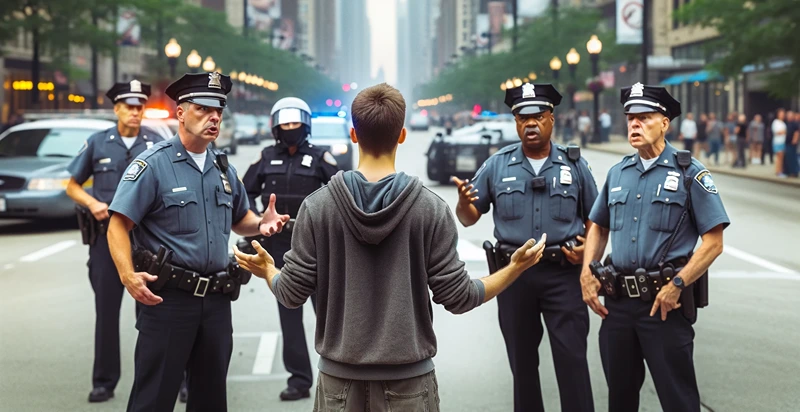
The Complete Guide to Disorderly Conduct Law in Arizona
Disorderly conduct is a vague term that can cover a wide range of offenses. In Arizona, the disorderly conduct law is summarized in ARS 13-2904. Understanding this law is crucial to protecting your rights and avoiding unnecessary legal trouble.
What is Disorderly Conduct in Arizona: ARS 13-2904
ARS 13-2904 defines disorderly conduct as any behavior that can reasonably lead to others being alarmed, disturbed, or provoked. Offenses covered by this law include but are not limited to:
- Fighting, threatening, or violent behavior
- Tumultuous or disruptive activity such as rioting or loud parties
- Offensive language or gestures that are likely to provoke a violent reaction
- Refusal to comply with lawful orders from a police officer to reduce disturbing behavior
This is a broad definition, and what constitutes disorderly conduct is often left to the discretion of law enforcement or the court. However, there are a few key terms used in the law that can help you understand your rights and responsibilities in different situations.
What Does Disturbing the Peace Mean?
Disturbing the peace is a term often used interchangeably with disorderly conduct. It refers to any behavior that causes a public disturbance, such as loud music or fighting. However, each state can have its own definition of what constitutes disturbing the peace. In Arizona, it is covered under ARS 13-2904 as part of the disorderly conduct law.
Is Cursing Considered Disorderly Conduct?
Sometimes, but not always. While offensive language or gestures can be considered disorderly conduct if they are likely to provoke a violent reaction or cause public disturbance, cursing alone is not enough to warrant a disorderly conduct charge.
Drunk and Disorderly Charges
Being intoxicated in public is not a crime in Arizona, but it can lead to a disorderly conduct charge if your behavior leads to others being alarmed, disturbed, or provoked. This can include acts such as belligerent behavior, fighting, or disrupting the peace.
Is Domestic Violence Considered Disorderly Conduct?
Domestic violence is a separate offense from disorderly conduct, although they can sometimes overlap. Domestic violence refers to any criminal behavior done against an intimate partner or family member. It includes physical harm, emotional abuse, and threats of violence. While not all domestic violence cases involve disorderly conduct, some actions covered by ARS 13-2904 can lead to a domestic violence charge.
What are the Penalties for Disorderly Conduct?
The penalties for disorderly conduct depend on the severity and circumstances of the offense. Disorderly conduct is usually classified as a class 1 misdemeanor, which can lead to up to six months in jail and a fine of up to $2,500. However, some actions covered under ARS 13-2904 can be classified as a class 6 felony, which can result in up to 18 months in jail and a fine of up to $150,000.
What are the Defenses For Disorderly Conduct?
If you are charged with disorderly conduct, there are a few defenses you can use to fight the charges. These include:
- The behavior was protected free speech or expression
- You did not intend to disturb the peace
- You were acting in self-defense
- You were coerced or misled into committing the behavior
Frequently Asked Questions
Can I be charged with disorderly conduct for using a megaphone in public?
It depends on the situation. If the megaphone use is part of a peaceful protest or demonstration, it is likely to be protected under the First Amendment. However, if it causes a public disturbance or is used to incite violence, it could lead to a disorderly conduct charge.
Can I be charged with disorderly conduct if I swear at a police officer?
It is possible, especially if the officer reasonably perceives the behavior as a threat or disturbance. However, if the swearing is not directed at the officer or part of a larger disturbance, it is not likely to lead to a disorderly conduct charge.
Can I be charged with disorderly conduct if I refuse to leave a restaurant after being asked to do so?
Not necessarily. Refusing to leave a private property can be a civil offense, but it does not usually merit a disorderly conduct charge unless it escalates to a public disturbance or violent behavior.
How an Arizona Criminal Lawyer Can Help
If you are facing disorderly conduct charges in Arizona, it's important to seek out an experienced criminal defense attorney. A skilled lawyer can help you understand your rights, build a defense, and guide you through the court process. Contact the team at Kolsrud Law Offices for a free consultation - we're here to help you protect your future.
Disorderly Conduct Law in Arizona: ARS 13-2904






